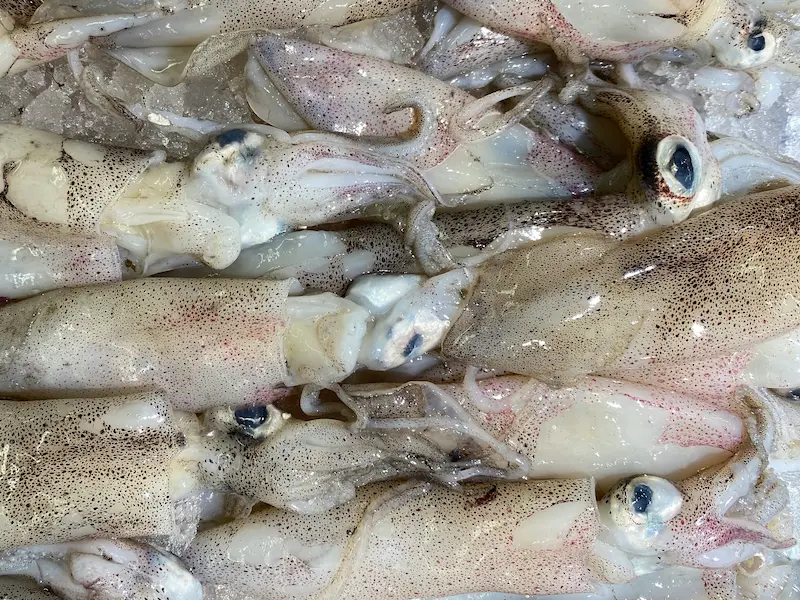The Patagonian Squid and Its Nutritional Value

The Patagonian squid, also scientifically known as Loligo gahi, is a species of squid that primarily inhabits the cold, nutrient-rich waters of the South Atlantic near the Patagonian region.
This cephalopod is noted for its economic importance in the fishing industry, being a highly sought-after commercial product, not only appreciated for its delicate flavour and versatility in the kitchen but also for its impressive nutritional profile. Rich in proteins, low in calories and saturated fats, and a source of important vitamins and minerals, this seafood represents an excellent addition to any healthy diet.
The nutritional profile of the patagonian squid
Thanks to its rich diet and the marine environment in which it lives, the Patagonian squid boasts an exceptionally rich and beneficial nutritional profile for health. It is a fantastic source of high-quality proteins, essential for the building and repair of tissues in the human body. Moreover, it is rich in vitamins and minerals, including vitamin B12, selenium, and phosphorus, which are crucial for optimal brain functioning, the immune system, and bone health.
This information about the nutritional profile of the Patagonian squid is collected in studies conducted by marine research and nutritional institutions, such as the United States Department of Agriculture (USDA) and the Food and Agriculture Organization of the United Nations (FAO). These organisations provide comprehensive databases detailing the nutritional composition of marine foods, including squid.
Nutrients per 100 grams of Patagonian Squid:
In every 100 grams of the product, we can find approximately:
- Calories: 92 kcal, making it a low-calorie food, ideal for weight management diets.
- Proteins: 15.58 g, providing a high-quality source of essential amino acids for growth and tissue repair.
- Total Fats: 1.38 g, of which a large part are polyunsaturated fatty acids, including omega-3s, beneficial for the heart and brain.
- Omega-3 Fatty Acids: 0.50 g, essential for brain functions and cardiovascular health.
- Cholesterol: 233 mg, an amount that should be considered within a balanced diet.
- Vitamins: The squid contains Vitamin B12, necessary for the nervous system and blood formation, and Vitamin E, an important antioxidant.
- Minerals: It is an excellent source of selenium, with approximately 44.8 mcg, and phosphorus, with 221 mg, both essential for various bodily functions, including bone health and thyroid function.
Comparison with other squid species

Although specific data may vary depending on the source and analysis method, when comparing the Patagonian squid with other squid species, it is observed that, in general, this species stands out for its higher concentration of omega-3 fatty acids and minerals. This is partly due to its natural diet and the unique ecosystem of the Patagonian region. While other squid species may have quite similar nutritional profiles, the Patagonian squid tends to have a higher content of certain essential nutrients, making it especially valuable from a nutritional standpoint.
High-Quality proteins
The Patagonian squid is a great source of proteins, but it has a similar concentration to that of other species, such as the Loligo vulgaris or common squid. All squid species are perfect food for diets focused on muscle development and post-exercise recovery, for example.
Rich in Omega-3 fatty acids
While all squid species are good sources of omega-3, the Patagonian squid stands out for its higher proportion of EPA and DHA, essential fatty acids for cardiovascular and cognitive health. This fact makes it a good option for those looking to optimize their omega-3 intake.
Minerals
Selenium: The Patagonian squid is particularly rich in selenium, an essential mineral for thyroid health and the immune system, compared to other species. This high selenium content helps fight oxidative stress and promotes a healthy immune system.
Phosphorus: Although phosphorus is abundant in many types of squid, the Patagonian squid tends to have higher levels, contributing to bone and kidney health.
Health Benefits of the Patagonian Squid
The rich nutritional profile of the Patagonian squid offers several health benefits. Eating squid is especially recommended for various diets and health conditions, due to its low calorie and high protein, omega-3 fatty acids, and essential minerals levels.
Squid in weight management diets
Being a low-calorie and high-protein food, as already mentioned, it is a perfect ingredient for weight management diets. Besides its low caloric content, proteins help to feel fuller for longer, promoting weight loss or maintaining a healthy weight, as long as it is prepared healthily.
Omega 3, key for cardiovascular health and brain functions
Omega-3 fatty acids contribute to reducing triglyceride levels and blood pressure, key factors for cardiovascular health. The Patagonian squid is rich in these fatty acids, making its consumption suitable for people with or at risk of cardiovascular diseases, obviously as long as it is cooked without using cooking methods that add unnecessary fats. Thus, it is more advisable to cook squids grilled, sautéed, or baked, rather than fried.
On the other hand, fatty acids are fundamental for optimal brain function, making the Patagonian squid a recommended food for the prevention of cognitive disorders and the improvement of mental health.
Squid and diabetes
The Patagonian squid has a low carbohydrate content, meaning it has a low glycemic index and is suitable for people with diabetes, helping to keep blood glucose levels stable.
Squid and cholesterol
Although squid may have a moderate cholesterol content, the type of fats present (especially omega-3s) plays an important role in balancing HDL (good) and LDL (bad) cholesterol, being a healthy option. However, those concerned about their blood cholesterol level or those with pre-existing conditions that require a low-cholesterol diet should moderate their consumption.
Despite its cholesterol content, squid contains few saturated and trans fats, which are more impactful on blood cholesterol levels than dietary cholesterol itself. Therefore, moderate consumption of squid, preferably cooked in healthy ways such as steamed or boiled, can be part of a balanced diet without jeopardizing cardiovascular health.
Bone and Thyroid health
The Patagonian squid is also rich in minerals. Its high content of selenium and phosphorus offers a great contribution to maintaining bone health and thyroid function, respectively, making squid a useful addition to diets focused on these areas of health.
Thus, as we have seen, the Patagonian squid is a versatile and delicious food that can be enjoyed in various ways, from gourmet dishes to simple homemade meals, but besides the culinary diversity it offers, its rich nutritional profile also provides multiple health benefits.
However, as with any other food source, it is important to consume it as part of a varied and balanced diet. Individuals with specific medical conditions or concerns about cholesterol and diabetes should always consult a healthcare professional for personalised recommendations.
References:
- Food and Agricultural Organisation of the United Nations (FAO) Species Fact Sheets. Loligo gahi (Orbigny, 1835) 2021
- FAO Species Catalogue Vol.3. Cephalopods of the World: https://www.researchgate.net/publication/37907852_FAO_Species_Catalogue_Vol_3_Cephalopods_of_the_World_An_Annotated_and_Illustrated_Catalogue_of_Species_of_Interest_to_Fisheries
- Nutritional and Healthy Value of Chemical Constituents Obtained from Patagonian Squid (Doryteuthis gahi) By-Products Captured at Different Seasons – https://www.ncbi.nlm.nih.gov/pmc/articles/PMC8465112/
- Venugopal, Vazhiyil, and Kumarapanicker Gopakumar. “Shellfish: nutritive value, health benefits, and consumer safety.” Comprehensive Reviews in Food Science and Food Safety 16.6 (2017): 1219-1242.
- Torrinha A., Gomes F., Oliveira M., Cruz R., Mendes E., Delerue-Matis C., Casal S., Morais S. Commercial squids: Characterization, assessment of potential health benefits/risks and discrimination based on mineral, lipid and vitamin E concentrations. Food Chem. Toxicol. 2014;67:44–56.
- Chengchu Liu, Nicholas V.C. Ralston, Chapter Seven – Seafood and health: What you need to know?. Advances in Food and Nutrition Research,Academic Press,Volume 97 Pages 275-318,2021
- Cervantes-Pérez, Enrique & Cervantes-Guevara, Gabino & Cervantes-Pérez, Gabino & Cervantes-Pérez, Lorena & González-Ojeda, Alejandro & Fuentes-Orozco, Clotilde & Cervantes-Cardona, Guillermo & Pérez de Acha, Andrea. (2022). El rol de la nutrición en la salud mental y los trastornos psiquiátricos- una perspectiva traslacional. 5. 51-60. 10.35454/rncm.v5n1.358. https://www.researchgate.net/publication/359584656_El_rol_de_la_nutricion_en_la_salud_mental_y_los_trastornos_psiquiatricos-_una_perspectiva_traslacional
- Shaziya Allarakha, MD. Wish Seafood is highest in cholesterol? https://www.medicinenet.com/which_seafood_is_highest_in_cholesterol/article.htm
- Linus Pauiling Institute. Centro de información de Micronutrientes. Fósforo: https://lpi.oregonstate.edu/es/mic/minerales/fosforo
- Linus Pauiling Institute. Centro de información de Micronutrientes. Fósforo: https://lpi.oregonstate.edu/es/mic/minerales/fosforo
- National Institutes of Health. Office of dietary supplements. Selenio: https://ods.od.nih.gov/factsheets/Selenium-DatosEnEspanol/
———

Current challenges in the industry: Reflections on the second 2023 Patagonian squid campaign in the Falkland Islands.

Hubbsi hake or Argentine Hake

